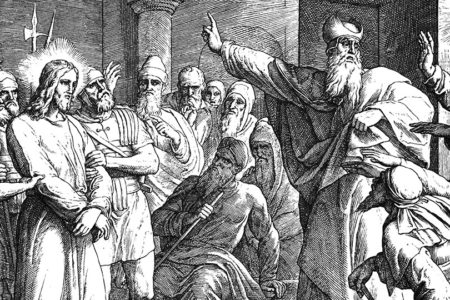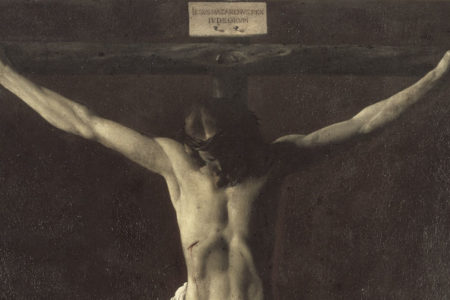No Greater Love
The Crucifixion and Resurrection of Jesus
“For he was cut off out of the land of the living; for the transgression of my people was he stricken” (Isa. 53:8).
The sum of all that is taught in the Old Testament Scriptures comes before us in this stunning word from the prophecy of Isaiah. The Messiah, writes the prophet, will become the final sacrifice for the sins of the people. Details of the divine purpose are so clear, when compared to the crucifixion and resurrection of Jesus, that there is no reason to doubt that He was the promised Messiah of Israel and Savior of the world.
According to God’s Word through Isaiah, the Messiah would make “his grave with the…rich…make his soul an offering for sin,” and satisfy the demand for a perfect sacrifice—“He [God] shall see of the travail of his soul, and shall be satisfied” (53:9–11).
Following the last sacrifice sanctioned by God on any altar came the word that the Messiah would be gloriously resurrected, in affirmation of all that the Lord had planned in His program of redemption.
Yet it pleased the Lᴏʀᴅ to bruise him; he hath put him to grief. When thou shalt make his soul an offering for sin, he shall see his seed, he shall prolong his days, and the pleasure of the Lord shall prosper in his hand…Therefore will I divide him a portion with the great, and he shall divide the spoil with the strong, because he hath poured out his soul unto death; and he was numbered with the transgressors; and he bore the sin of many (53:10, 12).
That’s the whole story: Humiliation and death would be followed by resurrection and an era during which the Messiah will reign. Thus we see the convergence of both aspects of the Messiah’s ministry: the suffering servant; the reigning King.
The Timing of the Messiah’s Suffering
For the Jewish people—and for all of us who revere the sanctity of the Scriptures—there is a critical matter to be reckoned with. Daniel 9:26 reveals that before the Temple was destroyed in 70 A.D., “shall Messiah be cut off, but not for himself.” In other words, the Messiah was to be “cut off” short of attaining the Kingdom. Isaiah explains just what was involved in this first cutting off. “He was cut off out of the land of the living; for the transgression of my people was he stricken” (53:8).
Comparing the passages, we learn that the Messiah’s death would precede His kingly reign, would be specifically a sacrifice for sins, and would take place before the Temple was destroyed by the Romans in 70 A.D.
Two Thousand Years Late
A few months ago, I stood in a room in Jerusalem looking out over the Western Wall and the Temple Mount. It is an impressive sight. Even more attention-getting is the room itself. On the door entering the room is a sign. It says, “Sanhedrin.” Inside is a series of semicircular tables. Before the tables are 70 seats. The tables are situated to focus the attention of those seated on a single raised seat reserved for the ruler of the Sanhedrin. This room, constructed under the direction of the late Rabbi Schlomo Goren, is prepared for Israel’s leaders to direct the affairs of the nation when a new Temple is built on Mount Moriah.
Today a number of other groups, each independent, are engaged in active preparations for the building of a Jewish Temple in Jerusalem:
- Those preparing vessels, furnishings, and priestly garments.
- Those identifying qualified priests to serve at the Temple.
- Those studying sacrifices and services to be performed.
- Those who have cut a cornerstone for the new Temple.
Collectively, these people are extremely sincere and intelligent and command respect from those who are in contact with them. However, it can be said with finality that those who are planning to build a Temple for the purpose of reinstituting sacrificial worship are two thousand years late. The final sacrifice has already been made. There is, therefore, no longer a need for an altar in the Holy City.
No Greater Love
In the upper room, as Jesus commemorated His final Passover with the disciples, He made this statement: “Greater love hath no man than this, that a man lay down his life for his friends” (Jn. 15:13). Greater love has, in fact, never been displayed than when God sent His only Son to fulfill the words of the law and the prophets.
In the Jewish Temple worship and in great national celebrations, the final act of God’s great love was prophetically anticipated. With the suffering, death, and resurrection of the Messiah, that love was demonstrated.
Last October we were filming a series in Israel for the Day of Discovery television program. The subject was the feasts of Israel and what principles from them can be applied to our lives in this day and age. My segment for each program dealt with how Jesus related to the feasts. Although I have studied Israel’s feasts with great fascination for decades, I was deeply moved to think once again of what they were really all about. If the person and work of the Messiah are removed from those celebrations, we are left with only memorable traditions and thoughts of an era now lost to us. But with the sacrifice of the Messiah as the heart and soul of all that was depicted in the sacrificial system, the ceremonies reveal an eternal reality with principles that are vital to our lives today and our prospects for eternity.
There is a feature in the cross work of Jesus that is often overlooked but, indeed, manifests the depths of the love of God for His Chosen People and a lost world. For centuries, anti-Semites have vilified the Jewish people as Christ-killers deserving the worst that can befall them. As a people (the line goes), they have been guilty of calling the wrath of God down upon their own heads and, what is worse, on their children.
“Then answered all the people, and said, His blood be on us, and on our children” (Mt. 27:25).
In this scenario, scant attention is given to two facts.
First, the crowd was incited to their actions because they were incited by a group of unscrupulous leaders who were not only betraying the Christ, but their own people as well. “But the chief priests and elders persuaded the multitude that they should ask for Barabbas, and destroy Jesus” (Mt. 27:20).
Second, malicious anti-Semites, some of whom blasphemously call themselves Christians, never mention the attitude of Jesus toward those who railed against Him. What did He say from the cross? “Father, forgive them; for they know not what they do” (Lk. 23:34). Of whom was He speaking? The very people implicated in putting Him on the cross! It is true that the majority of Jewish people live in unbelief, but in view of the obvious compassion of Christ—even for those contributing to His crucifixion—a serious question must be asked. How many Jewish people have persisted in unbelief because of churches and individuals who call themselves Christians yet manifest vindictive attitudes totally incompatible with the compassion of Christ? We cannot escape the conclusion that such people will be required to answer for deliberately ignoring the example of the Savior, thus contributing to the persecution of Jewish people.
Paradise Gained
“And there were also two others, malefactors, led with him to be put to death” (Lk. 23:32).
That Jesus did not despise Jewish people—nor, for that matter, any deemed to be sinners—was again manifested in His encounter with the penitent thief while suspended on the cross. Perhaps we are given a hint of the penitent’s heritage when he petitioned Christ to remember him when He entered His kingdom. This is hardly what we would expect to hear from a pagan.
Fascinating indeed is the revelation that when Jesus was hung between two malefactors, He was not only among them but specifically named as one of them. When Jesus was brought before Pilate by an entourage from the Sanhedrin, Pilate inquired as to the nature of the charges against Him.
“They answered, and said unto him, If he were not a malefactor [criminal], we would not have delivered him up unto thee” (Jn. 18:30).
Once again, the precision of the prophetic Scriptures comes into play: “He was numbered with the transgressors” (Isa. 53:12). But this is not all that Isaiah had to say about a Messiah impaled between two criminals. “And,” the prophet continued, “[he] made intercession for the transgressors.”
The thief, who a short time before had reviled Jesus (Mk. 15:32), was now pleading to be remembered. I wonder what passed through his mind when he heard Christ’s reply: “Verily I say unto thee, Today shalt thou be with me in paradise” (Lk. 23:43).
These were not the words of some charlatan pretender who suddenly found himself with no way out. If that had been the case, Jesus would not have concerned Himself with intercession for a common thief. No indeed! His concern would have been for someone to make intercession for Him.
“Greater love hath no man than this, that a man lay down his life for his friends”—but, even more astounding, also for His enemies.
For the Joy That was Set Before Him
“Looking unto Jesus, the author and finisher of our faith, who for the joy that was set before him endured the cross, despising the shame, and is set down at the right hand of the throne of God” (Heb. 12:2).
The thief on the cross looked for a place in Christ’s coming kingdom. The joy of Jesus is found in the reality of the resurrection, His ascension to the right hand of the Father, and the kingdom to come in which He will reign over redeemed Israel.
Today the resurrection is an irrefutable reality. Following His death, burial, and resurrection, Jesus “was seen of above five hundred brethren at once” (1 Cor. 15:6)
The efficacy of His saving intercession is attested to by the millions who, for nearly two thousand years—like the penitent thief—have petitioned Him to secure, by His own blood, their eternal future.
As if this were not enough, there is still a well of irrepressible joy yet to spring from His mercy and grace. Israel’s long-sought kingdom will come at last—when the King shall come in all of His glory.
“And his feet shall stand in that day upon the Mount of Olives, which is before Jerusalem on the east…And the Lord shall be king over all the earth; in that day shall there be one Lord, and his name one” (Zech. 14:4a, 9).
The anonymous songwriter penned much more than he could possibly have known when he wrote:
“The love of God is greater far than tongue or pen can ever tell.”







